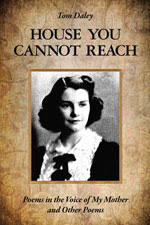
*
Somerville Bagel Bard Alice Weiss is our guest columnist this week. She reviewed the latest poetry collection by noted local poet and teacher Tom Daley.
House You Cannot Reach:
Poems in the Voice of My Mother and other Poems.
By Tom Daley
(FutureCycle Press)
Review by Alice Weiss
This is a book of Browningesque dramatic monologues. A character is designated, “My Mother.” A character is designated, son. He is the recorder, the redacter. He gives her voice, and what a voice it is! Here is Mother, an angel bathing her between her legs, addressing her sons:
And that’s where you
you head firsters, blind and slick,
scraped your glossy scalps
and heaven knows why
. . .
With every contraction
in every post-Eden birth,
I salute the smirk
in Eve’s twinge. I bless
her broken water
and her trespassing teeth.
Note the movement from the scrappy comedy of birth and delivery, to the mythical. Revising the story of Eden, defying it and claiming it: Eve’s twinge smirks, and her teeth “trespass” Just that word conjures up another prayer, Don’t bother to forgive our trespasses, this last is the ritual ordinary and then: “we will all one day/ fall—or swim unbounded by any womb,” fall out of the myth into:
. . . a tub’s clean porcelain,
forgetting
to drown or crawl.
Read as a whole, the book is filled with clusters of language that shake up convention, bring comic exaggeration to a disturbingly precise level of linguistic experience.
In a whalebone walkabout
he unties the fire-blight of his smiles—
smiles scored like stone Buddhas, smiles that implode
Snowing rock dust over pastures and shoals.
“Prodigal at Point Reyes”
See how complex the alliteration in whalebone walkabout, the w’s, and b’s, the ‘ l’ in whale, silently echoed by the ‘l’ in walk, but pointing to the compressive activity of the accented, rhythmic ‘walkabout’, and then the contrast in the next line, all long ‘i’s, but reinterpreting the ‘l’s in sound as well as meaning as the smiles betray themselves.
‘
Here’s a hope chest
Where mothballs
Seal the rot in his slapstick.
The hoard the stains where his T-shirts
sweated out Trotskyist proverbs.
Here’s a cruet for his chrism,
a vat for his vinegar.
“My Mother Speaks with Two Police Officers
Who Arrive at Her Door on Good Friday Afternoon”
In this last quote, from a poem referring to the speaker’s brother’s suicide, the Mother enumerates his (metaphoric) possessions, the hoard of stains, the Trotskyite proverbs and the cruet for his chrism,” a small bottle for the anointing oil used in the Mass, and “ the enormous “Vat for his vinegar.” Vinegar stinging scouring wine turned bitter. “Confession,” she holds, “ is a tongue stroked into blare,” in “My Mother’s litany for the Feast Day of Saint Bibiana,” the saint of headaches. In another poem, “After a Stroke, My Mother Listens to a Chapter of Tolstoy’s War and Peace,” a novel in which she finds cold comfort.:
Frostbite is an indifferent fever,
is a blackhead’s Passion Play,
is a discharge of burning.
It is evident from the beginning of the book even from reading the table of contents that there is an underlying narrative threading through the pages. A Passion Play is a form of drama that tells the story of the death of Jesus. The mother’s is a blackhead’s Passion Play. First Mother and son curled around each other in a comedic and agonizing reflection of the virgin and her son. The father from whose abandonment the mother never recovers, The mother whose sensual memories last as long as her fury at his betrayal. God and the various Saints, whose failure is nowhere more evident than in the inability of the wedding sacrament to hold the man to her, leaving her
a woman sucker-switched
and swatting wide.
After a stroke the mother loosens her language. turns even wilder and yet miraculously projects a reasoned, if jaded a reasoned grasp of the world and its troubles. The final drama for her is her children’s failure to give her descendents. It strands her in time. With these poems, the son, the narrator gets the better of that. She in fact descends like the angel Gabriel blowing a complex heavenly horn..
One more thing. The issue of descendents of the biological replication of the self, reveals itself in the quietly saddest poem:”My Mother Explains Why She Threw Away All My Dolls.” She is the mother, for all their closeness, who cannot but point out that his “dowsing stick [is] bent in the wrongest ways.” She threw away the Raggedy Anns. She was the “Erasing Angel,” she admits, but she cannot budge.
Son, if you cannot speak
to sorrow in the full skin
of a man.
I will not hedge tomorrow
just to lose it in your hands.














Reader Comments